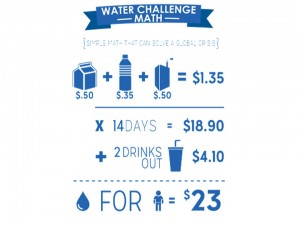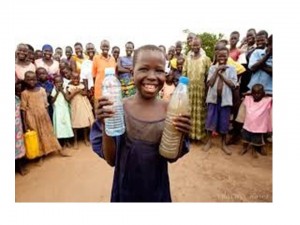Approximately 1 billion people around the world are affected by the water scarcity epidemic (The Water Project, 2015). Water scarcity is the lack of access to clean and healthy drinking water. Although water scarcity can occur in developed countries, the water epidemic is more prevalent for individuals in developing countries, and for those that live in poverty.
Things to think about…
In developed countries such as the United States, water is a substance that flows abundantly and many of us do not think twice about our water usage. Water is a vital part of our everyday lives; we use it to cook, clean, bathe and to quench our thirst. However, have you ever taken the time to think what your life would be like if you did not have access to clean and healthy drinking water? For children and families in developing countries, this is their reality.
Effects water has on us…
According to water.org (2015), “Every minute a child dies from water-related illness”. People in developing countries have to choose whether to drink the water that causes death or not drink the water that might cause death. Illnesses that occur from drinking unhealthy/unsafe water can prohibit a child from receiving a quality education and perpetuate the cycle of poverty.
“Poor Health Leads to Lack of Productivity”
Access to clean/healthy drinking water
Approximately 80% of illnesses in developing countries are linked to poor water and sanitation conditions (The Water Project, 2015). If there is not water, people cannot engage in proper sanitation practices, which can perpetuate the illnesses that are spread.
Effects the water epidemic has on Women and Children
In various cultures around the world, women and girls are seen as the homemakers, who stay home to cook and clean. For women and children in developing countries, girls and women suffer the most because they take on the primary responsibility of fetching drinking water. “Every day, women and young girls carry more than 40 pounds of dirty water from sources over four miles away from their homes (The Water Project, 2015)”. The amount of time that women and children spend traveling to fetch water prohibits them from living out their full potential. Young girls often times have to miss school because they are traveling to provide water for their families. Also, girls that are going through puberty may skip school due to the lack of sanitation that is available at schools. Due to the lack of water, young girls are not able to receive a quality education and over time are more likely to drop out of school.
“Lack of Water = Lack of Equality”
A Call to Action: What you can do?
As you can see, the water epidemic is a fight that affects people all over the world. It is an epidemic that affects people’s everyday lives in areas such as health, nutrition, and education. The lack of clean water in developing countries prohibits individuals from living a healthy life and living to their fullest potential. Women and children suffer the most from water scarcity because they carry the heaviest burden.
There are various organizations that are helping to provide clean and safe drinking water for people in developing countries to improve their quality of life. With the help of your donations you can be the change in transforming someone’s life forever.
The following are steps that can be taken to help in the fight against this epidemic:
- Learn more about the water scarcity epidemic (links listed below).
- Donate to various organizations.
- Start a fundraiser at your local school, church, or organization. Example: The Water Project’s “Water Challenge”
- The challenge is to drink only water for two weeks and save the money you would have spent elsewhere, and donate it to The Water Project. One could save enough money to provide water for one person.
http://thewaterproject.org/thewaterchallenge
Supporting these organizations can change the lives of people in a small village and the lives of women and children across the globe.
